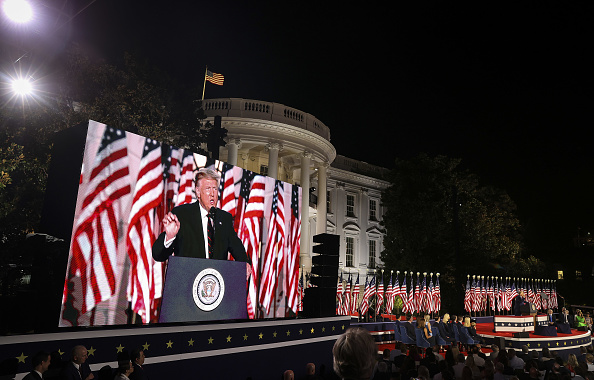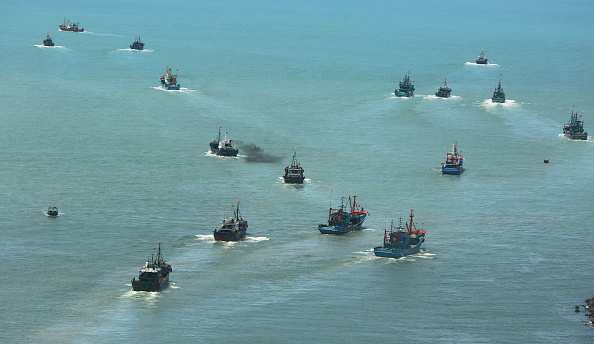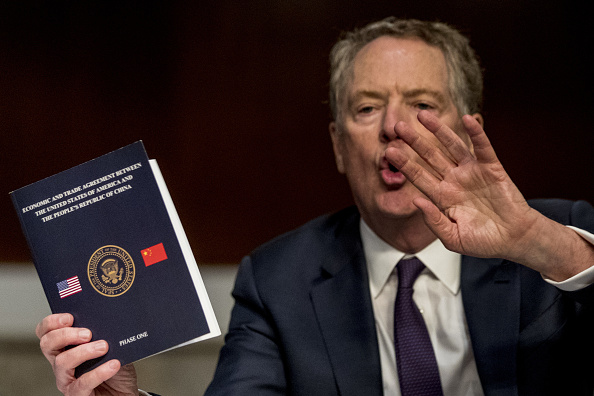
 Who's Tougher on China?
Who's Tougher on China?China starred as America's global adversary at the Republican National Convention this week, with four nights of speeches and events. A central narrative was which party was tougher on China, with a strong emphasis on Democratic Presidential nominee Joe Biden's poor record on U.S.-China relations. Senator Marsha Blackburn of Tennessee characterized Biden as being "soft" on China, and blamed China for failing to control the coronavirus during the virus's early stages; while Senator Tom Cotton of Arkansas claimed that Beijing was "rooting for Joe Biden."
Chinese human rights activist Chen Guangcheng made an unlikely appearance at the event, issuing strong condemnation of China as well as Joe Biden's policy approach. In his speech, Chen called the Chinese Communist Party an "enemy of humanity," and labeled the Democrats' China platform a "policy of appeasement" that has "allowed the CCP to infiltrate and corrode different aspects of the global community." Secretary of State Mike Pompeo also highlighted the administration's strong stance on China, and applauded President Trump for pulling "back the curtain on the predatory aggression of the Chinese Communist Party."
As President Donald Trump prepares to battle Joe Biden at the polls this coming November, China has become a centerpiece in Trump's reelection plan. While being seen as "tough on China" is vital for the incumbent president, former Vice President Biden's stance on China is not as clearly defined. Read more in "Inside Biden's China Policy", from Yang Wenjing, Chief of U.S. Foreign Policy at the Institute of Contemporary International Relations.
 Murky Waters
Murky WatersThe U.S. and China jostled in the South China Sea early this week after the U.S. sent a U-2 spy plane to the area, drawing condemnation from Beijing. Beijing considers the region a no-fly zone and the U.S. reconnaissance craft's movement an act of "trespass[ing]". Days later, China fired two medium range missiles into the area, signaling its dominance in the contested maritime region. A spokesman for the Chinese Ministry of National Defense said that the "exercises are not directed at any country."
In response, the Pentagon released a statement saying "conducting military exercises over disputed territory in the South China Sea is counterproductive to easing tensions and maintaining stability." Meanwhile, the U.S. released a new set of visa and export restrictions against state-owned enterprises involved with China's plans for developing in the South China Sea. For more on the two country's military relationship, check out our latest episode of the Pacific Dialogue, featuring Admiral William Owens and Major General Yao Yunzhu.
 Trade Temperature Check
Trade Temperature CheckU.S.-China trade talks resumed this week, and both sides reaffirmed their commitment to the principles of January's phase one agreement. Speaking by telephone Monday evening, U.S. Treasury Secretary Steven Mnuchin, U.S. Trade Representative Robert Lighthizer and Chinese Vice Premier Liu He continued the negotiation process. China's Ministry of Commerce called the talks "a constructive dialogue," while Lighthizer's office said that both sides "are committed to taking the steps necessary to ensure the success" of Phase One, and potentially a Phase Two deal.
Markets saw a boost on Tuesday after the two countries reaffirmed their trade commitments. China is also set to buy a record high amount of soybeans from the U.S. this year, while China's purchases of sorghum from the U.S. is also on track to break previous records.
Prepared by China-US Focus editorial teams in Hong Kong and New York, this weekly newsletter offers you snap shots of latest trends and developments emerging from China every week, while adding a dose of historical perspective.
- 2020-08-22 To Talk, Or Not To Talk
- 2020-08-15 Domestic Circulation
- 2020-08-07 Fraying Relations
- 2020-08-01 Turning Tides
- 2020-07-24 Up in Smoke
- 2020-07-17 Status Stripped
- 2020-07-10 A Historic Moment
- 2020-07-03 Handover Tested
- 2020-06-27 Relationship Spiral
- 2020-06-20 Bolton Bombshell
- 2020-06-13 Fits and Starts
- 2020-06-06 Confluence of Crises
- 2020-05-29 Questions of Autonomy
- 2020-05-22 Pandemic Decisions
- 2020-05-16 Fractures and Fault Lines
- 2020-05-09 Attacks and Counterattacks
- 2020-05-02 Retaliatory Actions
- 2020-04-24 Sinking Perceptions
- 2020-04-18 Pandemic World
- 2020-04-11 The Long Road Back to Normalcy